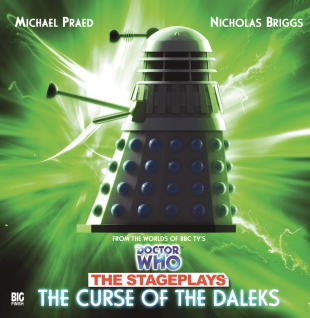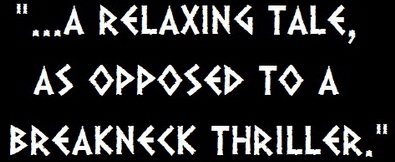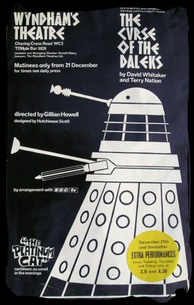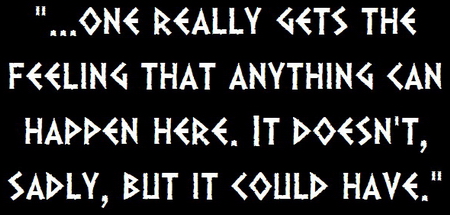|
| |
|
STORY PLACEMENT This STORY TAKES PLACE FIFTY YEARS
AFTER THE DALEK (OR THEREABOUTS).
WRITTEN BY
DAVID WHITAKER &
ADAPTED BY NICHOLAS BRIGGS
DIRECTED BY NICHOLAS BRIGGS
RECOMMENDED PURCHASE BIG FINISH STAGE PLAYS CD#3 (ISBN 1-84435- 375-0) RELEASED IN NOVEMBER 2008.
BLURB The SS Starfinder is taking two criminals for trial on Earth. En route, they have to make an emergency landing on Skaro – the planet of the dreaded Daleks.
But Captain Redway and his faithful crew don’t anticipate any trouble. After all, the Daleks were defeated fifty years ago and now they are completely inactive.
But when a crate full of mysterious devices is discovered and the Daleks start to come back to life, it SOON becomes clear that there is a traitor amongst the crew… ...A traitor intent on reactivating the power of the Daleks! |
|
|
PREVIOUS ("DR WHO" ALTERNATIVE)
The Curse of the Daleks NOVEMBER 2008
The final release in Big Finish’s stage plays range takes us back to the earliest days of Doctor Who, with a play that was originally produced way back in 1965. The Daleks were taking the country by storm, and it was evident that they didn’t need the Doctor to be a success. So it was that the very first Doctor Who stage play didn’t feature the Time Lord at all; instead, The Curse of the Daleks follows the exploits of a group of humans, fifty years or so after the Daleks’ occupation of the planet Earth.
generally unexplored, although it is likely that these events are not meant to be considered part of the ongoing series as a whole. Certainly, later events in Doctor Who don’t really fit with them; but then, Dalek history never really makes any sense from one tale to the next. It seems that, after throwing the Daleks off the Earth, human forces pursued them to Skaro where they deactivated them. Now, space agents make regular visits to the Skaro system (which seems surprisingly close to our own) just to make sure that things are running smoothly, and that the Thals haven’t accidentally reactivated their enemies or something.
We join our hero, Jonathan Ladiver, played here by Michael Praed (Robin of Sherwood), as he is being taken back to Earth to stand trial. A former space captain, Ladiver is now accused of sundry acts of treason which “almost started a space war.” Praed plays the part with a powerful intensity, his voice mostly quiet yet always dominating the scene. Ladiver is a fine character, and a three-dimensional one too; we find that he is no mere criminal as the story progresses. A man who’d risk imprisonment or execution to further his venerable goals is certainly one to admire and a force to be reckoned with; still, one does have to wonder if there wasn’t an easier way to accomplish his plan than to spend several years pretending to be a criminal! Nevertheless, Praed’s performance displays a confidence in the character that dispels any doubts in him. Other characters and cast members meet with varied levels of success. Patric Kearns never truly convinces as Captain Redway, although he does retain his stiff upper lip throughout. Nick Wilton is a diamond as ‘Rocket’ Smith (‘Rock’ for short), a cheeky space pilot who remains likeable comic relief despite his 1960s sexism. Bob Slater is brought to life with all James George’s charismatic panache, while John Line – the original Ladiver - gives Professor Vanderlyn a depth and believability that makes you overlook the fact that this 23rd century scientist is dealing not only in shillings but dubious physics too! Marion Chambers, his assistant, is much less successful, although I believe none of the fault lies with actress Beth Chambers; she’s simply written as an irritating expression of a typical 1960s male’s view of a feminist. Derek Carlyle is oily as slave-trading criminal Harry Sline, a despicable character that you can’t help but love to listen to. The two Thals – Dexion and Ijayna, the latter Ladiver’s lost love – are pretty two-dimensional; Glynn Sweet and Denise Hoey do their best with the roles they’re given.
Nicholas Briggs, adapter and director, also narrates the action and provides the voices of the Daleks. The decision to use narration in the play is a wise one; as he explains in the accompanying features, the play as originally shown was extremely visual; the choice was to alter the dialogue substantially to make it work, or go for the old-fashioned narration. It works perfectly, suiting the gentle storytelling to a tee. Indeed, The Curse of the Daleks sounds better suited to audio than either of the previous releases in the range. Perhaps trying to stick too closely to the original format is a mistake; an audio drama is a substant-ially different medium to a stage play. The Dalek voices are, as always, highly impressive and commanding. However, sometimes the two-disc adventure does start to sound a little like the Nick Briggs Show. Although I normally decry those who incessantly whinge about Briggs monopolising roles in the series, recognising the continued sterling work he does in keeping Doctor Who entertaining and thriving, there comes a point when you’ve heard his voice(s) enough…
land on Skaro. Someone is a traitor, determined to revive the Daleks. Fortunately, Ladiver is right were he wants to be; he knows how dangerous the Daleks are, and wants to be back with his Thal comrades to deal with them once and for all. The play pootles along at a saunter, never rushing anywhere, even in the most action-packed Dalek scenes. Nonetheless, this is part of the play’s charm, harking back to the gentler version of the series that now belts along on Saturday nights. Admittedly, with the slow pace and long monologues, I did find my mind drifting on more than one occasion; however, this strikes me as a production that could perhaps be comfortably listened to in the background many times; a relaxing tale, as opposed to a breakneck thriller. It’s a very 1960s production in more ways than just the pace though; there are some truly cringeworthy moments of sexist banter, and the science is very dubious in places (water can’t boil at light speed? You what?) but that’s probably less to do with the time it was written and more to do with the fact that it was written by David Whitaker. Still, these are commented upon in the production features, and are part of the appeal of revisiting a “period” piece.
While by no
means an exhilarating chase or terrifying invasion, The Curse of the
Daleks is an enjoyable listen, and it’s a treat to have the chance
to experience it.
|
|
|
Copyright © Daniel Tessier 2008
Daniel Tessier has asserted his right under the Copyright, Designs and Patents Act, 1988 to be identified as the author of this work. |
|
|
Unlike Doctor Who’s two subsequent stage plays, The Curse of the Daleks was in danger of being forgotten by fandom prior its Big Finish resurrection. Having only enjoyed a few weeks’ run at London’s Wyndham Theatre in December 1965 and January 1966, this Doctorless matinée piece was not survived by any photographs. Even tracking down David Whitaker and Terry Nation’s script was a labour for Big Finish exec Nicholas Briggs, who upon finding it found himself tasked with adapting a very visual and a very dated stage play for a modern audio audience.
The Big Finish adaptation has a beautifully genuine feel to it. Despite his profuse apologies to all that starred in it and even those that listen to it, Briggs very sensibly resolved to stay as close to the source material as possible, however politically incorrect or peculiar. The Curse of the Daleks is thus riddled with rampant sexism and “silly science”, and is punctuated with frequent bursts of narration that apprise the viewer of what would be unfolding on the stage. Whilst some will no doubt be scathing of such aspects, I applaud both – the flagrant sexism is fundamental to the plot (and quite hilarious to boot), and the narration is presented in such a cold and clinical fashion that most of the time it feels like Briggs is just reading out stage directions verbatim. Furthermore, as particularly the first act is high on talk and low on action, the bursts of narration really help the pace, especially given that they’re backed by a driving riff lifted from Briggs’ own rendition of the Doctor Who theme tune.
and claustrophobic, and populated with a cast of colourful characters. The dearth of Daleks in the first act is tremendously disappointing, and was no doubt even more so for the children perched on the edge of their seats back in the 1960s, but it does at least build a lot of tension as the listener is left guessing as to which humanoid protagonist is in league with the Daleks, as well as prompting some fabulous performances from the likes of Derek Carlyle; James George; Nick Wilton; and especially my childhood hero, Michael Praed. The former Robin of Sherwood instils the play’s leading character with fierce intensity, his velvety tones perfectly suited to the medium.
The second act of the play is much livelier than the first. The Daleks finally emerge in great big armies of two and three, apparently under the control of ‘Bob’ who has stirred them from their slumber so that they can help him conquer and enslave the universe. It’s delightfully silly, yet at the same time incredibly grim, incorporating a number of elements from the popular Power of the Daleks, which Whitaker would go on to pen the following year. What’s more, without the Doctor around to act as a safety net, as with Briggs’ own Dalek Empire series, one really gets the feeling that anything can happen here. It doesn’t, sadly, but it could have.
Overall The Curse of the Daleks is another little piece of ephemera
that has been lovingly preserved forever. The story may not be perfect,
but the production is sublime, and it even comes with its own little Dalek
rhyme. “Remember, remember the Dalek December…”
|
|
|
Copyright © E.G. Wolverson 2010
E.G. Wolverson has asserted his right under the Copyright, Designs and Patents Act, 1988 to be identified as the author of this work. |
|
|
The events of the story apparently take place approximately fifty years after either the television serial The Dalek Invasion of Earth, or the Milton Subotsky movie Daleks: Invasion Earth 2150AD, depending on which branch of continuity you’re following.
|
|
|
Unless otherwise stated, all images on this site are copyrighted to the BBC and are used solely for promotional purposes. ‘Doctor Who’ is copyright © by the BBC. No copyright infringement is intended. |
|

.jpg)

 This is a piece of the Whoniverse
This is a piece of the Whoniverse
.jpg)

.jpg)
 The
story itself is edgy
The
story itself is edgy .jpg)